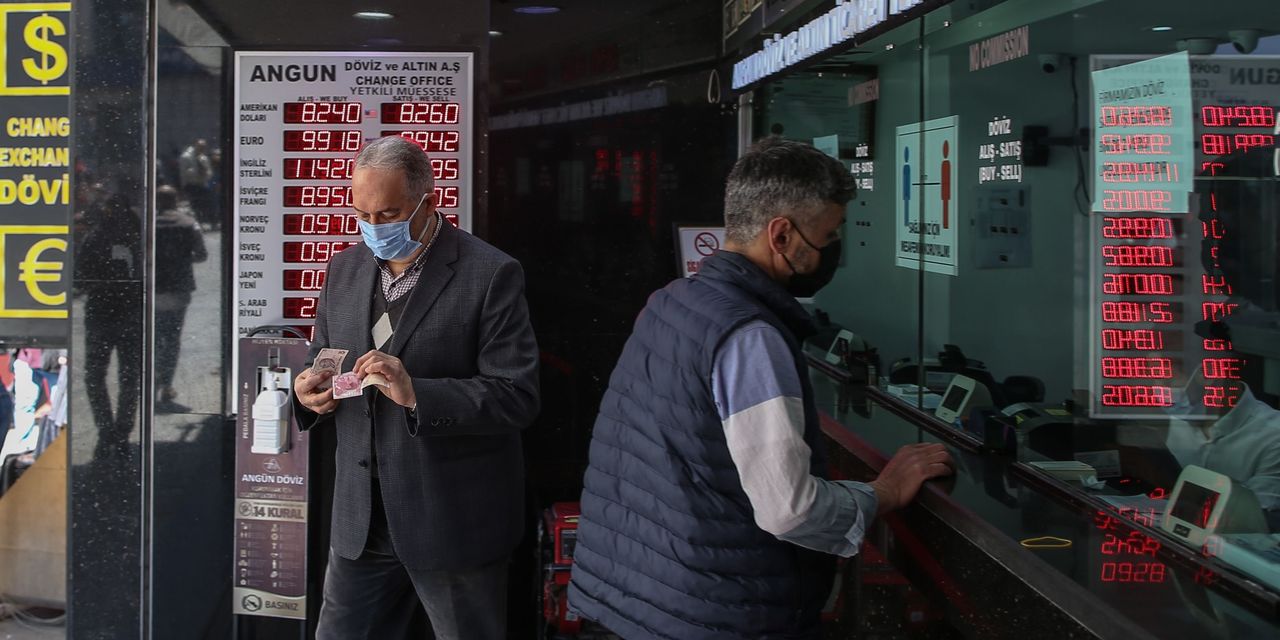Early tightening of the Federal Reserve’s policy could ripple across emerging markets that are dependent on the U.S. dollar. Prime among them is Turkey.
The Turkish lira has come under pressure in recent weeks as investors try to assess whether the country’s central bank will heed the demands of its president to cut interest rates. But a rate cut could drag the lira down further at the same time that the country’s high inflation rate is already diminishing the currency’s buying power.
Turkey’s economy is among the most vulnerable to signs the Fed is going to raise rates since a stronger dollar makes it harder for Turkey to pay its foreign-currency debts. Federal Reserve officials signaled Wednesday that they expect to raise interest rates by late 2023, sooner than they anticipated in March. That puts Turkey’s central-bank policy at risk from potential efforts in the U.S. to manage its own inflation conditions down the road.
A move toward tighter policy in the U.S. “would be a huge negative surprise for markets and very negative for emerging-market assets,” said Daniel Wood, a portfolio manager at William Blair Investment Management. “Turkey would likely suffer disproportionately given its reliance on strong risk sentiment from international investors.”
A stronger dollar would also add further pressure to the Turkish lira. Turkey’s currency hit a record low on June 4, when it fell to 8.7532 lira to the U.S. dollar, after Turkish President
Recep Tayyip Erdogan
called for lower interest rates by July or August. That has left investors to assess whether the country’s central bank will heed Mr. Erdogan’s demands.
Mr. Erdogan has fired three central bank chiefs in less than two years, and he prefers low rates as a part of a strategy to encourage growth. His reluctance to have higher interest rates could mean that investors’ returns are eroded. A recent rise in the cost of oil past $70 a barrel is also likely to boost inflation in Turkey.
Investors expect inflation to pick up globally this year due to supply-chain bottlenecks and higher demand for goods and services as pandemic restrictions ease. While a high-growth environment is typically good for emerging-market assets, Turkey may struggle to raise interest rates.
“Central bankers’ careers aren’t dependent on the level of interest rates in most emerging market countries, so it will be harder for Turkey to stay more competitive for capital flows,” said Erik Meyersson, senior economist at Swedish bank Handelsbanken. “Right now, positive news for the global economy in terms of higher rates is not good news for Turkey.”
Turkey has long struggled with high inflation, which erodes the buying power of the lira for imports. If inflation climbs above the country’s benchmark one-week repo rate, which stands at 19%, it diminishes returns for overseas investors. Central bank governor Sahap Kavcioglu has told investors he will keep interest rates above inflation, which stood at 16.59% in May, down from 17.14% in April—its first decrease since September 2020.
After Mr. Erdogan fired former central bank governor
Naci Agbal
in March following repeated rate increases, foreign investors pulled out $1.9 billion from Turkish stocks and local-currency bonds. In the 10 weeks since, Turkey recovered just $30 million, according to data from its central bank.
Bringing back foreign money into stocks and bonds is essential to fund Turkey’s gap between its imports and exports in what is known as the current-account deficit. Turkey burned through much of its foreign currency reserves last year in an attempt to slow the depreciation of the lira by selling other currencies and buying back the lira.
Turkey has also struggled to recoup foreign currencies usually gained from tourism as travel remains restricted for residents of many countries for the second summer in a row.
“Tourist season in Turkey is still very much at risk. They’re clearly doing what they can and trying to get tourism workers vaccinated and create as hospitable an environment as possible, but it’s going to be hard,” Mr. Meyersson said.
Write to Caitlin Ostroff at caitlin.ostroff@wsj.com
Copyright ©2020 Dow Jones & Company, Inc. All Rights Reserved. 87990cbe856818d5eddac44c7b1cdeb8













































